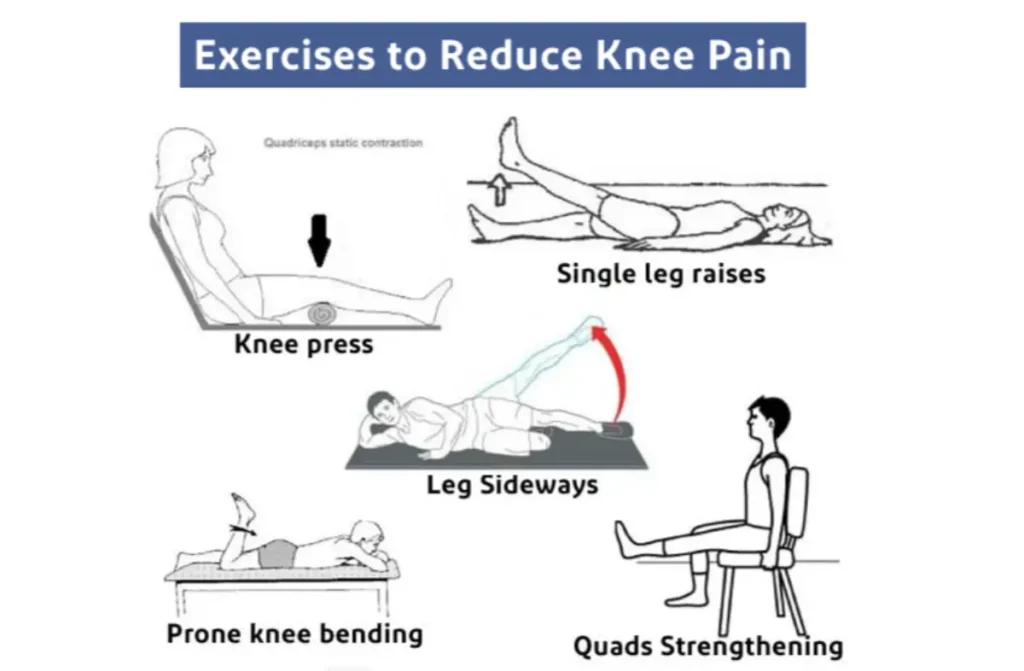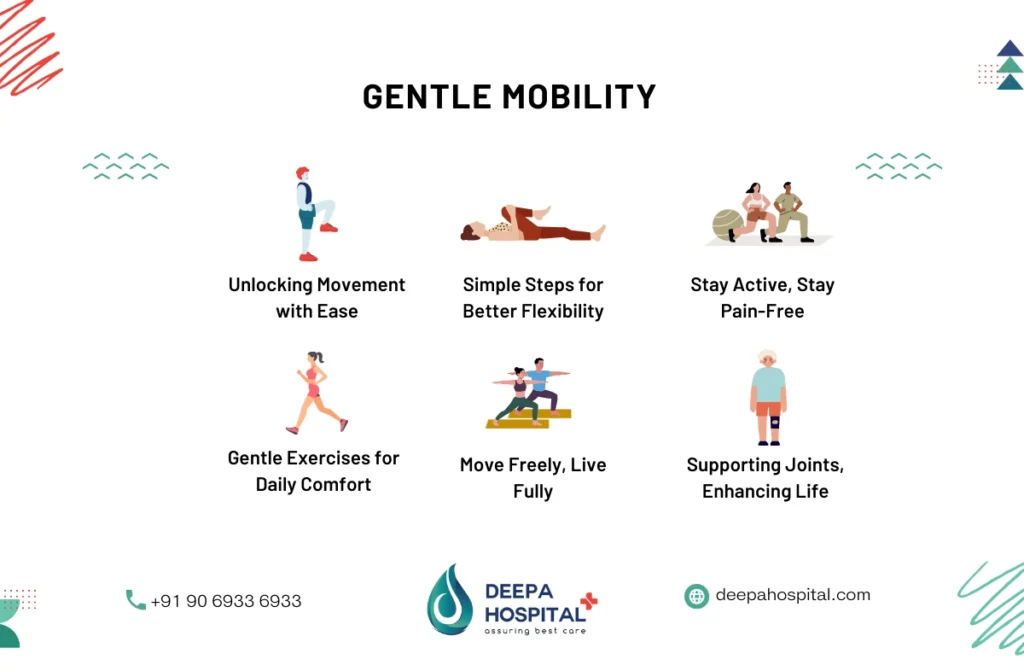Knee strengthening exercises for knee pain are simple yet effective ways to manage discomfort and improve mobility. Whether you’re recovering from an injury, dealing with arthritis, or experiencing regular knee aches, these exercises can make a real difference. By strengthening the muscles around your knee, you can provide better support and reduce pain. In this blog, we’ll cover essential knee strengthening exercises for knee pain, including some that are especially helpful for seniors and the elderly. We’ll also give you important tips to stay safe and pain-free while exercising.

Essential Knee Strengthening Exercises for Pain Relief
Leg Lifts
Leg lifts are a great way to start with knee strengthening exercises for knee pain. They are low-impact and simple, making them ideal for anyone, including knee strengthening exercises for seniors.
- How to do it:
- Lie on your back on a mat.
- Bend one knee while keeping the other leg straight.
- Lift the straight leg slowly to the height of the bent knee.
- Hold for a few seconds, then lower it back down.
- Repeat 10-15 times for each leg.
- Benefits:
- Strengthens the quadriceps (thigh muscles).
- Improves knee stability.
This exercise is also a good choice for those looking for knee strengthening exercises for elderly individuals.
Standing Hamstring Curls
This is another easy and effective exercise for improving knee strength and reducing pain.
- How to do it:
- Stand behind a chair for support.
- Bend one knee so your heel moves towards your buttocks.
- Hold for a few seconds, then slowly lower your leg.
- Repeat 10-15 times for each leg.
- Benefits:
- Strengthens the hamstrings.
- Enhances knee flexibility and stability.
Standing hamstring curls are especially useful as knee strengthening exercises for seniors because they don’t require lying down or too much balance.
Leg Extensions
Leg extensions help to build strength in the quadriceps without straining the knee joint.
- How to do it:
- Sit on a chair with your feet flat on the floor.
- Slowly extend one leg until it’s straight.
- Hold for a few seconds, then lower it back down.
- Repeat 10-15 times for each leg.
- Benefits:
- Strengthens knee muscles.
- Reduces pressure on the knee joint.
This exercise is excellent for anyone who needs gentle knee muscle exercises.
Step-Up Exercises
Step-up exercises are simple and very effective for building knee strength.
- How to do it:
- Use a step or a low platform.
- Step up with one foot, then bring the other foot up.
- Step back down with the same foot.
- Repeat 10-15 times for each leg.
- Benefits:
- Improves balance and knee strength.
- Strengthens thigh and hip muscles.
Step-ups are perfect if you’re looking for exercises for hip and knee pain relief.
Single-Leg Squats
Single-leg squats are a bit more challenging but great for knee strengthening.
- How to do it:
- Stand on one leg and extend the other leg slightly forward.
- Slowly bend your standing leg, lowering yourself slightly.
- Straighten back up.
- Repeat 5-10 times for each leg.
- Benefits:
- Builds strength in knee and hip muscles.
- Improves balance and stability.
For elderly individuals, this can be done with the support of a chair.
Wall Squats
Wall squats are an excellent way to strengthen your knees and thighs without putting too much strain on your joints.
- How to do it:
- Stand with your back against a wall.
- Slide down until your knees are bent at a 90-degree angle.
- Hold for a few seconds, then slide back up.
- Repeat 5-10 times.
- Benefits:
- Strengthens thighs and knees.
- Improves endurance and stability.
Wall squats are effective knee strengthening exercises for knee pain because they don’t require sudden movements.
Lower-Body Stretches for Knee Pain
Before starting knee strengthening exercises for knee pain, warming up with stretches can prevent stiffness and enhance flexibility. These stretches target the lower body to improve mobility and reduce strain on the knees.
Effective Lower-Body Stretches:
- Quadriceps Stretch – Stand and pull one ankle towards your glutes, holding for 20-30 seconds.
- Hamstring Stretch – Sit with one leg extended, lean forward, and reach for your toes.
- Calf Stretch – Stand facing a wall, press your heel into the ground, and lean forward.
These stretches are particularly useful for individuals performing knee strengthening exercises for seniors or knee strengthening exercises for elderly, as they help loosen tight muscles before exercise.
The Importance of Stretching After Exercises
Stretching after doing knee strengthening exercises for knee pain is crucial. It helps reduce stiffness and prevent injuries.
- Key Stretches:
- Hamstring Stretch: Sit with one leg extended and reach for your toes.
- Quad Stretch: Stand and pull one foot towards your buttocks.
- Benefits:
- Improves flexibility.
- Reduces muscle soreness.
- Enhances overall mobility.
Read also Knee Replacement Surgery Cost in Chennai
Benefits of Knee Strengthening for Pain Relief
Doing regular knee strengthening exercises for hip and knee pain has many benefits, including:
- Reduced Pain: Stronger muscles support the knee better, reducing pain.
- Improved Mobility: Helps you move more easily and confidently.
- Better Stability: Reduces the risk of falls, especially for seniors.
- Increased Strength: Builds the muscles around the knee for better support.
These exercises are particularly helpful for those needing knee strengthening exercises for elderly and knee muscle exercises.
Knee Pain from Squatting: What to Do
Knee pain from squatting is a common issue caused by improper form, weak muscles, or joint strain. Addressing the root cause and making adjustments can help alleviate pain and prevent further discomfort.
Here’s what you can do:
- Check Your Form: Ensure proper alignment with knees tracking over toes and avoid leaning too far forward.
- Strengthen Muscles: Incorporate knee muscle exercises like leg raises and lunges to build stability.
- Warm Up: Stretch and warm up your muscles before squatting to improve flexibility and reduce strain.
- Use Support: Seniors can benefit from modified squats or holding onto a stable surface for balance.
- Rest and Ice: Rest the affected knee and apply ice to reduce inflammation and pain.
Adding knee strengthening exercises for seniors like wall sits and seated leg lifts ensures joint health and reduces pain during squatting. Always consult a professional if pain persists.
Post-Exercise Stretching
After completing knee strengthening exercises for knee pain, cooling down with post-exercise stretches prevents muscle tightness and enhances recovery.
Best Post-Exercise Stretches:
- Seated Hamstring Stretch – Stretches the back of the thighs and improves flexibility.
- Calf Stretch Against Wall – Reduces stiffness in the lower leg and knee.
- Standing Quadriceps Stretch – Maintains knee mobility and prevents stiffness.
Regularly practicing knee strengthening exercises for elderly, knee strengthening exercises for seniors, and knee muscle exercises will improve knee function and prevent further pain. Incorporating exercises for hip and knee pain ensures a balanced, pain-free movement.
When to Consider Seeing a Physical Therapist in Advance
Seeing a Physical Therapist (PT) early can help prevent injuries from worsening and improve recovery outcomes. Recognizing when to consult a PT is crucial for long-term health, especially when dealing with mobility issues or pain.
Key Signs You Should See a PT Early:
- Chronic Pain – Persistent pain, especially in joints or muscles, that doesn’t go away with rest.
- Limited Mobility – Difficulty moving or performing daily tasks due to stiffness or weakness.
- Post-Surgery Recovery – A PT can guide you through rehabilitation to regain strength and function after surgery.
- Injury Prevention – If you’re starting a new physical activity, a PT can help with injury prevention strategies.
- Lack of Strength – For conditions like knee pain, a PT can recommend knee strengthening exercises for knee pain to prevent further damage and improve mobility.
Seeing a PT in advance can help you stay on top of your physical health and enhance overall performance and recovery.

Conclusion
Knee strengthening exercises for knee pain can help you reduce discomfort and improve mobility. Whether you’re a young adult or looking for knee strengthening exercises for elderly, these simple moves can make a big difference. Stronger knees mean less pain and better quality of life.
If you’re experiencing chronic knee pain and need professional guidance, CTS Hospital is here to help. Contact CTS Hospital to speak with experts and learn more about customized treatment plans.

